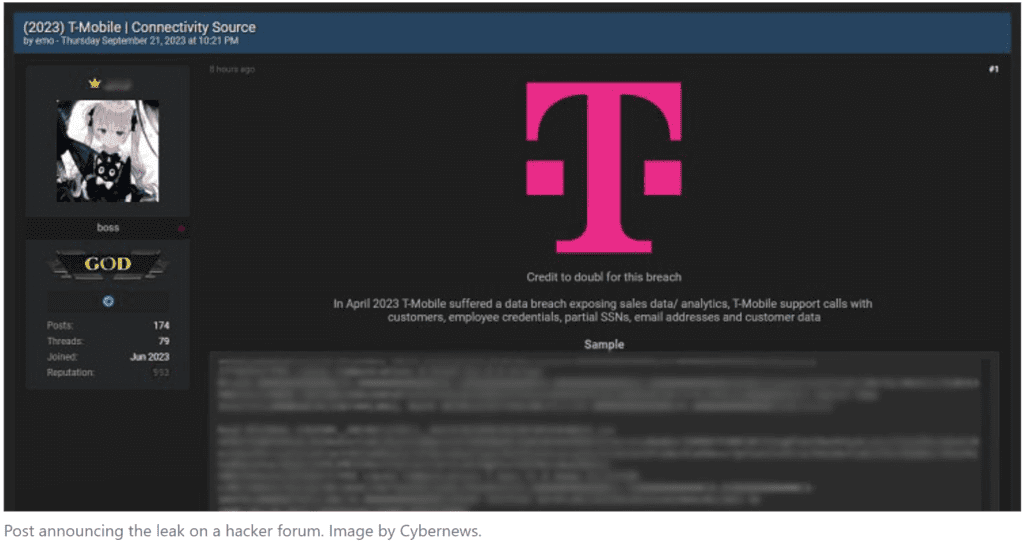T-Mobile, a global telecom giant, is facing a concerning trend with the possibility of a third major data breach in less than a year. Cybercriminals have recently claimed to have exposed a significant amount of sensitive information, including employee credentials, customer data, and other confidential records, potentially marking yet another security incident for the company.
This latest breach, allegedly occurring in April 2023, came to light when threat actors posted a substantial database on a notorious cybercriminal forum, naming it “T-Mobile, Connectivity Source.” Connectivity Source is an authorized retailer serving customers through T-Mobile-branded stores. While the exact contents of this leaked dataset remain unconfirmed, cybersecurity experts who examined the sample data shared by the attackers found it to be extensive, totaling a staggering 90 gigabytes. This raises serious concerns about the scope and depth of the breach.

Notably, T-Mobile has yet to officially confirm the breach, and attempts by cybersecurity experts and media outlets to elicit a response from the company have so far gone unanswered. This unsettling revelation follows closely on the heels of two other significant breaches reported earlier in the same year. In March 2023, T-Mobile disclosed a cyberattack where attackers potentially gained access to sensitive information, including T-Mobile account PINs, Social Security numbers, and customer names. In January 2023, the company fell victim to a breach that exposed the data of 37 million cell phone users, further underscoring the vulnerability of its systems.
These recent security lapses are not isolated incidents for T-Mobile. In August 2021, the company acknowledged a data breach when more than 100 million user profiles were leaked on an online forum, signaling a troubling pattern of data security issues within the organization. Such breaches not only raise concerns for T-Mobile customers but also cast doubt on the effectiveness of the company’s cybersecurity measures.
One particularly alarming incident involved customers inadvertently accessing the sensitive information of other customers when logging into their accounts. The exposed data included credit card balances, purchase history, credit card details, device IDs, and home addresses. T-Mobile attributed this issue to a “technology update” glitch but failed to provide immediate reassurance regarding data security.
Amid these ongoing breaches, T-Mobile’s reputation for data security has taken a hit, eroding customer trust. In 2021, a major data breach impacted 47 million individuals, resulting in a class-action lawsuit and a substantial $500 million settlement. Furthermore, T-Mobile faced a $2.5 million settlement last year as restitution for its involvement in the 2015 Experian data breach, which affected 15 million potential T-Mobile customers.
These recurring breaches underscore the critical importance of safeguarding the personal information entrusted to companies. While individuals can take proactive steps to protect their data online, they have limited control once a company’s security is breached. T-Mobile’s repeated security incidents emphasize the urgent need for companies to strengthen their cybersecurity defenses in response to evolving cyber threats.
Despite persistent rumors circulating on social media platforms about a third breach, T-Mobile has vehemently denied these claims. The company maintains that the leaked data actually belongs to an independently owned authorized retailer and is linked to a previous incident. T-Mobile employees, according to their official statement, were not affected.
As data breaches continue to rise in frequency and sophistication, businesses must adopt a proactive approach to protect their customers’ personal information. While there is no foolproof method of defense against determined cybercriminals, companies must prioritize robust cybersecurity measures to maintain trust and protect their reputation in an era of heightened digital threats. Consumer demands for improved data security may soon become too prominent for companies to ignore, making it unwise for them to wait for actual consequences before taking decisive action to secure their systems.

